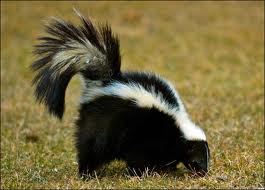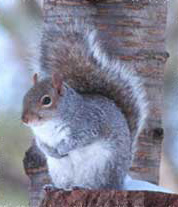Wildlife (Pest Control)
Skunks
Skunks are renowned for the horrible smell they emit when injured, frightened or mating. The odour can remain on pets and in ventilation systems for weeks or months. But these animals can also cause significant damage to buildings and landscaping. They are opportunistic animals that thrive in a diversity of habitats throughout Lower Mainland. Skunks are burrowers. In the wild they will dig into the ground at the base of a tree. In urban settings, they can be found underneath decks, sheds, porches, houses and other solid foundations. Once underneath, they will hollow out a bowl-shaped depression lined with grass and leaves. Two types of skunks common in Metro Vancouver are the spotted skunk (Spilogale gracilis) and the striped skunk (Mephitis mephitis). Skunks are omnivores but prefer to eat plants, veggies, fruits, insects, grubs, small animals and eggs as well as anything left in accessible garbage cans. Skunks are nocturnal and will venture out to forage most evenings.
Gray squirrel (Sciurus carolinensis)
Gray squirrel is a most common nuisance animal here in the Lower Mainland. Eastern Gray Squirrels are members of the rodent family and they are very active year-round. Squirrels are arboreal, which means that they live in trees, but they also seem to love attics. They are primarily active in the morning and evening (crepuscular). They eat all kinds of foods, but prefer nuts and seeds. Squirrels are usually about one pound in weight and usually live about 2-4 years in the wild.
They are one of the most likely animals to get into your house, and live in the attic, soffit, or walls. They bring nesting material into the house, and leave behind waste. They also chew on the wood in the attic and outside the home.
Raccoons (Procyon lotor)
Raccoons are easy to recognize with their distinctive black mask and ringed tail. They are well adapted for survival in cities and common pest nuisance in the Lower Mainland. Excellent climbers with strong nimble hands, they often explore, tearing new areas open in search of food and shelter. They like to den in trees as well as attics. Racoons are omnivores, and will eat almost anything they can get those crafty hands on when in search of food. They carry a number of parasites and diseases that can affect people or pets. They are carrier of rabies, a potentially fatal disease. Their feces may contain raccoon roundworm, the spores of which humans can breathe in and become seriously infected by, so it is important to capture raccoons using human habitat.
Call us today for EXPRESS FREE QUOTE at 604-726-4900
For professional pest control in
Burnaby, Vancouver, Coquitlam, Port Moody, North Vancouver, Richmond,
West Vancouver, Ladner, Tsawwassen, Maple Ridge, Surrey, Langley, Abbotsford, Mission, Lions Bay, Chilliwack, White Rock , New Westminster, Port Coquitlam



